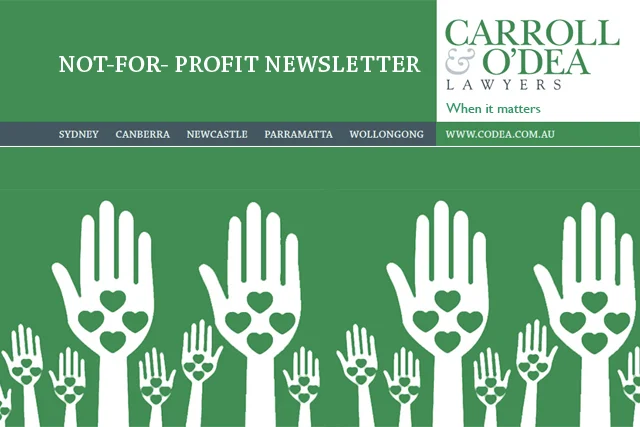
Not-For-Profit Newsletter – August 2013
Published on August 19, 2013 by Josephine Heesh and Patricia Monemvasitis
Welcome to the August 2013 edition of our not-for-profit Newsletter.
In this newsletter we provide you with summaries of some of the submissions made by Charitable Development Funds and other entities with interests in the banking sector in response to ASIC’s May Consultation Paper as well as an outline of changes in the pricing for aged care accommodation applicable to new residence post 1 July 2014.
We also report on two recent UK charities decisions: one of the cases concerned the implementation of certain adoption practices by Catholic Care UK and the other case raised the question of the validity of a gift made by a Catholic organisation to another not-for-profit organisation in the context of the giftor’s objects.
The need for the development of hardship policies has become more evident in the current economic climate so we provide you with our comments on issues to include and consider when developing your bespoke hardship policy.
Maithri Panagoda, one of our litigation partners has recently published an erudite paper titled “Stolen Generations LITIGATION in NSW” which can be found here.
In his paper Maithri considers the handful of cases brought to date by plaintiffs against the Government and in some cases the consequences of findings concerning the role played by the Aborigines Protection Board in some of those cases.
Maithri concludes in his paper:
“It is undeniable that the policies of past governments to forcibly remove Aboriginal children from their families, traditional lands and cultures have had devastating effects on those individuals as well as their communities…. It is strongly suggested that a repatriation-style tribunal would be the most cost-effective way of addressing this important issue”.
Finally, we are compiling a consolidated version of our writings covering the development of the ACNC and its early operations which we will publish in electronic book format later this month and circulate to our not-for-profit newsletter readers.
If you have friends who would be interested in our publication we encourage you to share it and as always welcome your feedback.
The Carroll and O’Dea not-for-profit team.
THANK YOU
RELIGIOUS CHARITABLE DEVELOPMENT FUNDS: POSSIBLE CHANGES ON THE WAY?
Religious Charitable Development Funds are a category of Charitable Fund Raisers, outside the banking regime. They are regulated by the Australian Securities & Investment Commission (ASIC) and the Australian Prudential Regulatory Authority (APRA).
Charitable Development Funds (CDFs) operated by Diocese throughout Australia fall into this category. They collect deposits from stakeholders and lend back for the work of those Diocese for the purpose of funding projects for church buildings, parish facilities, school buildings, hospitals and retirement villages and nursing homes.
DISCRIMINATION LAW IN THE UK AFFECTING ADOPTION PRACTICES
Catholic Care
In its 2012-2013 Annual Report the UK Anti Discrimination Commission (the Commission) noted that a small number of their decisions had been subject to challenge in the Charity Tribunal and in the Courts. The Commission’s Report detailed one very significant and prolonged matter that has been resolved in the last year. We provide you with a summary of this matter below.
UK GIFT FOUND NOT TO CONFORM TO GIFTER’S OBJECTS
The Confraternity of the Blessed Sacrament
In its recent Annual Report and Accounts, the UK Charities Commission reported that over the last 12 months, it had opened 15 statutory inquiries “of regulatory concern in charities”.
One such inquiry involved The Confraternity of the Blessed Sacrament.
The Confraternity, a charity that promotes the “advancement of the Catholic faith in the Anglican Tradition”, made a grant of £1m to The Ordinate of Our Lady of Walsingham, a Catholic organisation established in 2011 to “support Anglican priests converting to Roman Catholicism.”
AGED CARE REFORM
From 1 July 2014, payment of accommodation charges by residents in aged care homes will become more flexible if they are charged accommodation bonds (normally paid for self-care or hostel care living).
FINANCIAL HARDSHIP POLICY
The success of not-for-profits and small businesses is often built on a relationship of trust, loyalty and mutual reassurance with their client base. A strain in this relationship can form when a customer is unable to meet their financial commitments due to unexpected situations, such as:
- Loss of employment of a customer or a family member.
- Illness; including physical incapacity, hospitalisation or mental illness of the cusomer or a family member.
- Family breakdown.
- A death in the family of the customer.
THE GOOD NEWS
VOLUNTEERING CONFERENCE IN ALBURY NSW ON 29 AND 30 AUGUST 2013.
Albury will be home to the volunteering conference, ‘Country and City – Volunteering in the 21st Century’, on 29 and 30 August 2013. It will consist of a wide range of interactive sessions, engaging workshops and, crucially, it will offer practical approaches and solutions that can be applied in the real world.
NEW ACCESS – COACHES WHO HELP MENTALLY ILL BATTLE THE BLUES
The treatment of individuals suffering mild mental health issues could take a dramatic turn with a new program spearheaded by the not-for-profit organisation Beyond Blue which is starting its trial this month.

